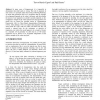Free Online Productivity Tools
i2Speak
i2Symbol
i2OCR
iTex2Img
iWeb2Print
iWeb2Shot
i2Type
iPdf2Split
iPdf2Merge
i2Bopomofo
i2Arabic
i2Style
i2Image
i2PDF
iLatex2Rtf
Sci2ools
122
click to vote
CORR
2002
Springer
2002
Springer
Value Based Argumentation Frameworks
In many cases of disagreement it is impossible to demonstrate that either party is wrong. The role of argument in such cases is to persuade rather than refute. Following Perelman, we argue that persuasion relies on a recognition that the strength of an argument depends on the value it advances, and that whether the attack of one argument on another succeeds depends on the comparative strength of the values advanced by the arguments. To model this we extend the standard notion of Argumentation Frameworks (AFs) to Value Based Argumentation Frameworks (VAFs). After defining VAFs we explore their properties, proving some results for VAFs with two values, and show how they can provide a rational basis for the acceptance or rejection of arguments, even where this would appear to be a matter of choice in a standard AF. In particular we show that in a VAF certain arguments can be shown to be acceptable independent of the relative strengths of the values involved.
Related Content
| Added | 18 Dec 2010 |
| Updated | 18 Dec 2010 |
| Type | Journal |
| Year | 2002 |
| Where | CORR |
| Authors | Trevor J. M. Bench-Capon |
Comments (0)

